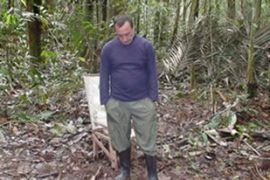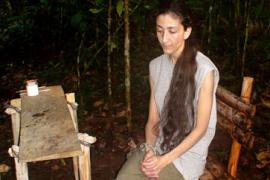Farc frees Colombia hostages
Four politicians had been held by the rebel group for more than six years.

Published On 27 Feb 2008
Barbara Hintermann, the Red Cross director for Colombia, said the helicopters are now en route to the border town of Santo Domingo before heading to the Venezuelan capital, Caracas, for the hostages to be reunited with their families.
“It’s a very important day for the Colombian people and for these four freed people,” she told journalists in the Colombian city of Bogota.
Chavez also spoke with the hostages by phone following their release, Jesse Chacon, a senior aide to the Venezuelan president told AP.
“We want the relatives to know they are in our hands and safe and sound,” Chacon said.
Red Cross spokesman Yves Heller said the two doctors on board the helicopters determined that the hostages were in good enough medical condition to travel, although more medical tests would be performed on them once they arrived in Venezuela.
Hostages’ health
The Revolutionary Armed Forces of Colombia (Farc) had offered on February 2 to hand over to the Venezuelan president three of the hostages.
Gechem was later added to the list on health grounds, as he is reportedly suffering from heart, back and ulcer problems.
The former state senator was kidnapped six years ago after Farc fighters hijacked a commercial aircraft he was travelling on.
His fellow former hostage, Polanco, was kidnapped with two of her sons, who were later released. Her husband, a prominent politician, was later killed by the Farc.
Her other son Daniel, who was 11-years old when his mother was seized, told journalists in Caracas on Wednesday that the kidnapping “surely tears out one’s insides”.
Remaining captives
 |
| There have been world wide protests calling for Ingrid Betancourt’s release [AFP] |
The hostages are part of a group of about 40 foreign captives whom the Farc want to swap in exchange for 500 of their fighters being held in Colombian prisons.
Two Colombian legislators, Consuelo Gonzalez and Clara Rojas, were released last month after an agreement brokered by Chavez.
Those still being held include three US Pentagon contractors and Ingrid Betancourt, the French-Colombian former politician.
Last week, rallies were held in France and Colombia to protest against her continued detention.
About 700 Colombian hostages, many of them civilians, are also reportedly being held by the group.
Chavez’s role
Al Jazeera’s correspondent Lucia Newman said that the Farc had freed the hostages because, firstly, they wish to be seen as a legitimate fighting force.
Secondly, they want the Colombian government to demilitarise a large area of the country so that negotiations can be held over a prisoner exchange.
Alvaro Uribe, the Colombian president, has indicated a willingness to negotiate an exchange of prisoners, but has ruled out demilitarisation of such a large and populated part of the country – suggesting a smaller, less inhabited zone instead.
Chavez has been involved in the hostage negotiations since last year, however an original deal to free the two women prisoners collapsed amid acrimony between Uribe and Chavez.
The Venezuelan president angered Colombia further when he said that Farc should not be labelled as a terrorist group but as a “belligerent force”, with legitimate political aims.
Source: News Agencies